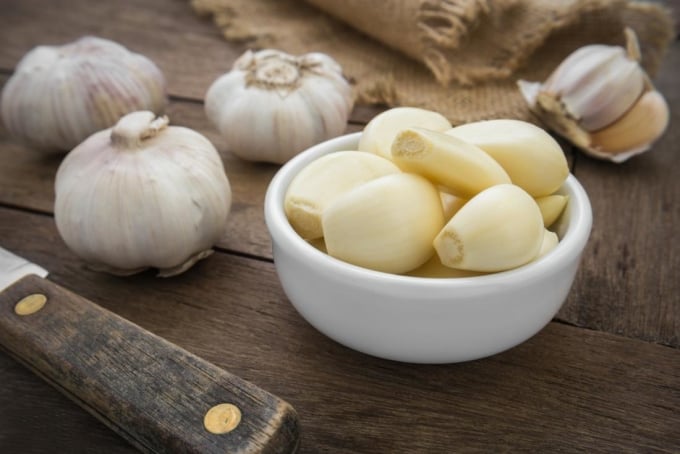Garlic, green tea, and cranberries contain natural compounds that have good antibacterial properties, helping to prevent and treat urinary tract infections.
Urinary tract infections (UTIs) are one of the most common infections in the world , affecting an estimated 150 million people each year. E. coli bacteria are the main cause of UTIs, along with other bacteria.
UTIs can be treated with antibiotics, but they often recur. Furthermore, overuse of antibiotics can have negative long-term consequences, such as reducing the number of beneficial bacteria in the urinary tract and contributing to the rise of antibiotic-resistant strains of bacteria.
Some studies have shown that up to 42% of mild, uncomplicated UTIs can be cured without antibiotics. Here are some natural herbs and supplements that may help prevent and treat mild UTIs.
Garlic
Garlic has long been used to treat a variety of ailments, including fungal, viral, and bacterial infections. Garlic’s healing powers are thought to be due to a compound called allicin. In studies, allicin has shown strong antibacterial effects against a variety of infectious bacteria that cause urinary tract infections, including E. coli. As such, garlic may be considered an alternative treatment for UTIs, but further research is needed to confirm its effectiveness.
Garlic can be consumed in its whole form, or it is sold as an extract and taken in capsule form. Garlic is safe for most people, but side effects such as heartburn, bad breath, and body odor may occur. Avoid it if you have a history of allergies to garlic or other closely related plants, such as onions or leeks.

Allicin in garlic has anti-bacterial properties that can help fight many types of bacteria that cause urinary tract infections, including E.coli. Photo: Medical News Today
Cranberries
Cranberry products, including juices and extracts, are one of the most popular options for treating UTIs. Cranberries contain a variety of chemical compounds, such as D-mannose, hippuric acid, and anthocyanins, which may limit the ability of bacteria to adhere to the urinary tract, thereby hindering their growth and ability to cause infection.
Test-tube and animal studies have shown that cranberries prevent UTIs, but human studies show less convincing results.
Cranberry juice and supplements are generally safe, but may cause stomach upset. Long-term use may also increase the risk of developing kidney stones. Additionally, consuming too many calories from cranberry juice can lead to unnecessary weight gain, and large doses of cranberry supplements may interfere with some blood-thinning medications.
Green tea
Green tea comes from the leaves of the tea plant (Camellia sinensis). They are rich in plant compounds called polyphenols, which have powerful antibacterial and anti-inflammatory effects.
Epigallocatechin (EGC), a compound in green tea, has been shown to fight strains of E. coli bacteria that cause urinary tract infections. Some animal studies have also found that green tea extract containing EGC may improve the effectiveness of some antibiotics commonly used to treat UTIs. However, human studies are lacking to evaluate green tea's ability to treat and prevent this condition.
One cup (240 ml) of brewed green tea contains about 150 mg of EGC. Research suggests that just 3–5 mg of EGC is enough to inhibit the growth of bacteria in the urinary tract, but this theory has not been proven in humans.
Green tea is safe to drink in moderation. However, it also contains caffeine, which can cause insomnia and restlessness. Additionally, consuming caffeine while you have a UTI can worsen your symptoms. Therefore, you may want to opt for decaffeinated green tea products instead.
Several other teas have also been shown to help prevent and relieve UTI symptoms, but more research is needed to prove them. These include:
Parsley Tea : Parsley has a mild diuretic effect, which is thought to help flush UTI-causing bacteria from the urinary tract. A combination of parsley tea, garlic, and cranberry extract has been reported to prevent UTI recurrence in some women with chronic UTIs. However, more research is needed to determine whether these results can be replicated in larger groups.
Chamomile Tea : Chamomile tea is used in herbal medicine to treat a variety of ailments, including UTIs. Like parsley, chamomile has a weak diuretic effect and contains plant compounds with anti-inflammatory and antibacterial properties. These properties are thought to help reduce inflammation, inhibit bacterial growth, and cleanse the urinary tract.
Peppermint Tea : Peppermint tea is also sometimes used as a natural remedy for UTIs. Several test-tube studies have found that peppermint leaves are effective against a variety of UTI-causing bacteria, such as E. coli. Certain compounds found in peppermint leaves may also reduce the bacteria’s resistance to antibiotics. However, there is currently no research supporting the use of peppermint tea to treat UTIs in humans.
UTIs can affect any part of the urinary system, but usually begin in the organs of the lower urinary tract, the bladder and urethra. Common symptoms associated with UTIs include: a burning sensation when urinating, frequent urination, cloudy, dark or bloody urine, fever or fatigue, pain in the pelvis, lower abdomen or back.... If you suspect you have a UTI, you should see a doctor as soon as possible, because a mild infection can quickly become serious, even fatal, if left untreated for too long.
Anh Ngoc (According to Healthline )
Source link































![[Photo] National Assembly Chairman Tran Thanh Man visits Vietnamese Heroic Mother Ta Thi Tran](https://vphoto.vietnam.vn/thumb/1200x675/vietnam/resource/IMAGE/2025/7/20/765c0bd057dd44ad83ab89fe0255b783)


































































Comment (0)